The current health of Venezuelan President Hugo Rafael Chavez can best be described as parlous.
The health of the leader of Latin America’s self proclaimed Bolivarian revolution has enormous global implications, even as the American press regards it as a minor diversion somewhere below March Madness.
Why should American’s care?
Well, for a start, according to the U.S. Energy Administration, the United States total crude oil imports now average 9.033 million barrels per day (mbpd), with the top five exporting countries being Canada (2.666 mbpd), Mexico (1.319 mbpd), Saudi Arabia (1.107 mbpd), with Venezuela in fourth place at 930 mbpd.
Venezuela has the largest conventional oil reserves and the second-largest natural gas reserves in the Western Hemisphere and in 2010 OPEC stated that of the organization’s 81.33 percent of the globe’s know oil reserves Venezuela had 24.8 percent, exceeding Saudi Arabia with 22.2 percent.
Any more questions as for the gringos should follow this?
The story began last summer, when the Venezuelan government made the dramatic announcement that Chavez underwent cancer treatment in Cuba. On 30 June Chavez confirmed in a televised address from Havana that he was recovering from a 10 June operation to remove an abscessed groin tumor which had been diagnosed as malignant. Two days later, Spain’s El Periodico de Catalunya reported that according to Venezuelan diplomatic sources Chavez had "colon cancer that has perforated the intestinal wall and has caused an infection in the abdomen." The Venezuelan government denied the report the next day.
The right-wing Latino press of southern Florida had a field day with the reports, gleefully insisting that Chavez was terminally ill, citing unnamed American intelligence specialists.
Since his initial diagnosis President Chavez has undergone three operations in less than a year and received two sessions of chemotherapy radiation treatment. Ever the optimist, President Chavez has said that his latest surgery was successful, that he is recovering well and that he will be fit to win a new six-year term at Venezuela’s presidential elections scheduled for 7 October.
But on 5 April, at a pre-Easter mass in Barinas the day after he returned from Cuba, President Chavez participated in a mass for his recovery, and the optimism faded as he said during the service transmitted by the official channel VTV amid a few tears described cancer as “a true threat that marks the end of the path for many people. The end of the physical path, that's the truth.” Chavez concluded, “Give me your crown, Jesus. Give me your cross, your thorns, give me your blood, I am prepared to carry it. But give me life, because I have more to do for this country and these people. Do not take me yet, Christ.” Amen.”
The biggest question in the event of President Chavez being incapacitated or killed by his cancer is the country’s political future, and of all the government’s branches the military is best positioned for the potential role of kingmaker. In February, shortly after President Chavez departed for Cuba for his second round of chemotherapy Admiral Anibal Brito wished his commander in chief god-speed, commenting, "Know, illustrious compatriot and masterful leader of the imperative Bolivarian revolution, that with you everything can be accomplished, without you - nothing."
During 13 years in power, mindful of the nation's history of coups d'etats, and the fact that he himself in 1992 led a failed coup that gave him national visibility and paved the way for his election in 1998, President Chavez has cultivated his support in the military from the lowest ranks up through the officer corps and the high command. On 4 April President Chavez noted the upcoming 10th anniversary of the 11 April 2002 coup by disgruntled military officers and rightwing politicians and businessmen that briefly removed him from office before his supporters took to the streets and loyal military units intervened. Whether Brito’s recent pronouncements of loyalty represent the majority thinking of the officer corps only time will tell.
Whatever one thinks of President Chavez’s politics, the fact remains that he is the first leader of Venezuela to have come up from the laboring classes of the country’s marginalized indigenous people by dint of his hard work, ambition and character. He has never forgotten where he came from, devoting much of his administration’s efforts to alleviating the appalling poverty afflicting Venezuela’s lower classes, in turn earning the enmity of the country’s political and business elites, who doubtless see the current situation as a golden opportunity to turn back the clock to the “good old days.” As the administration of President Chavez forced multinational energy companies to cede a controlling share in their ventures to the state-owned energy firm Petroleos de Venezuela S.A., behind the scenes the international oil firms will doubtless be angling to reverse the nation’s energy reforms as well.
Heightening the speculation that his condition is graver than portrayed, on Saturday President Chavez has said he will return to Cuba for a third round of radiotherapy to treat a recurrence of his cancer and flew back to Havana the next day.
Accordingly, should President Chavez’s health continue to deteriorate, expect a significant tussle to emerge between the Venezuelans who have benefited from his reforms versus those who would like to reassert control one of the few Western Hemisphere’s multi-million bpd assets.
By. John C.K. Daly of Oilprice.com


















